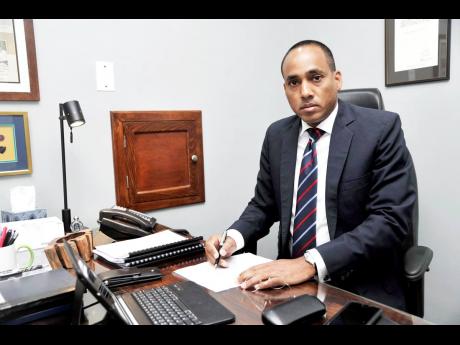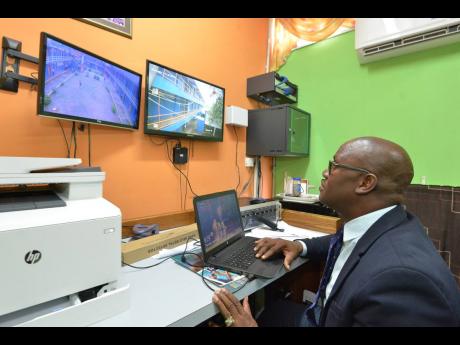Make CCTV mandatory – Champagnie
Attorney wants mandatory participation for businesses in JamaicaEye
On paper, the concept is a game-changer in the police’s anti-crime arsenal; but on the streets, its efficiency is up for moot. Three years after the launch of the JamaicaEye surveillance system, the country continues to see more than 1,200...
On paper, the concept is a game-changer in the police’s anti-crime arsenal; but on the streets, its efficiency is up for moot.
Three years after the launch of the JamaicaEye surveillance system, the country continues to see more than 1,200 homicides yearly – the bloodiest in Latin America and the Caribbean – and criminal convictions remain far below par.
The network is supposed to work on two fronts: Government-installed cameras capturing footage in tandem with closed-circuit equipment installed by business owners and other private entities. Both sets of cameras feed footage into a centralised bank for usage by the security forces in quick crime interception and major investigations.
In 2018, then National Security Minister Robert Montague called the system unique, adding that 180 government cameras had already been set up in some of the more problematic town centres, namely May Pen, Clarendon; Montego Bay, St James; Ocho Rios, St Ann; and within the Corporate Area. Last week, Permanent Secretary in the Ministry of National Security (MNS) Courtney Williams said that number is now up to 800 government-installed cameras.
However, things are not moving as speedily on the business side, where Williams said the Government is still trying to get a mere 300 entities islandwide to log on. This follows an MNS-signed memorandum of understanding with the Jamaica Gasolene Retailers Association, which connected 121 gas stations to the national system. Under the MOU, public-facing cameras will be fed into the system, explained the current security minister, Dr Horace Chang.
These low numbers have been mind-boggling for criminal defence attorney Peter Champagnie, who believes the authorities should force members of the business community through legislation to participate in JamaicaEye. That’s the only way the initiative will meet its intended target and make a more effective dent in crime-fighting locally, he argued. It will also force defence lawyers, like himself, to work harder in representing clients charged with heinous crimes.
VERY DISAPPOINTED
“I am very disappointed that our legislators have not yet introduced any bill in Parliament to make CCTV mandatory in public spaces such as certain business establishments that serve the public. It would be a game changer in the fight against crime,” said Champagnie, citing a recent case on Red Hills Road in St Andrew, in which the accused had no choice but to plead guilty after he was caught committing a crime on CCTV.
“It was CCTV footage that brought into focus the physical abuse suffered by a woman and the need to revisit impeachment proceedings for those who bring their public offices into disrepute,” noted Champagnie, citing a controversial video over which the police had named Westmoreland Central Member of Parliament George Wright as a person of interest.
The police have concluded their investigation into the matter and no charges were laid.
“It is CCTV footage that in a recent case of an alleged shooting of a son by a father that will feature heavily in the prosecution of the matter. These are just some of the recent examples of how important it is for CCTV to be mandatory,” said Champagnie, who is participating in that matter.
Noting the case of visually impaired university student Jasmine Deen, who has been missing for more than a year, the attorney made the case on how such legislation could have aided the police investigation and search efforts.
Currently, by law, the makers of the videos are asked to give statements to the police as part of the verification of video evidence in criminal probes. The courts must also be satisfied that the video footage is not edited in any way.
These stipulations may create fear for some participants, Champagnie reasoned. However, with his proposed legislation, those conditions and fears would not be as pronounced since the evidence would have already been authenticated through the official JamaicaEye system.
Companies, he posited, could be given tax incentives for the importation, purchase and set-up of their camera systems; and in other cases, failure to comply with the regulation would result in sanctions that get tougher with each violation, he proposed.
“We need that legislation. It (JamaicaEye) has solved a number of crimes and we can take advantage of that in terms of our small size as a country,” he continued.
“We are not talking about the little corner shops. We are talking about those businesses who are making money and who can afford the system,” he continued, responding to cost constraints posited by Williams, which he said did not hold water.
PERSUASION OVER LEGISLATION
Responding to Sunday Gleaner queries, Williams said: “Our preference is for persuasion over legislation and regulation. The added costs associated with imposing a mandatory JamaicaEye regime for businesses could make it burdensome, particularly for small marginal firms.
“A more suitable approach is to forge partnerships with businesses and impress upon them the gains to be derived in terms of safety to their individual businesses, customers, the community within which they operate, as well as the wider Jamaica,” Williams charged, noting that tax incentives would be the purview of the finance ministry. “That said, we can support such a proposal to the extent that the incentive will go a far way in easing the burden on businesses of procuring the equipment.”
It was not immediately clear last week how much of a dent the JamaicaEye system has so far had on crime, except for media reports. Williams, however, believes reception from businesses is strong, noting that participants are at differing stages of technical readiness. Some are procuring systems, while others are seeking to connect to the system.
Yesterday, Michael Leckie, president of the Small Business Association of Jamaica, said while owners like himself embrace the JamaicaEye system, the minimum $80,000 cost to set up such a system is prohibitive for many.
“For the larger companies, that may not be much, but for many of the small businesses, that is an added cost to them and consumers,” he charged, explaining that making participation mandatory would put businesses further under the knife, especially in a tough COVID-19 economy.
“It is not that we are against it, but if you have the choice between inventory and security, you are going to put goods in the shop,” he said.


